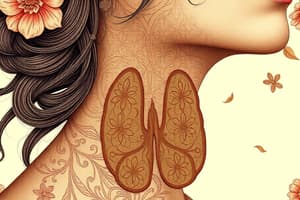Podcast
Questions and Answers
What is the most common cause of acromegaly?
What is the most common cause of acromegaly?
- Hypothyroidism
- Genetic mutations
- Pituitary adenoma (correct)
- Autoimmune disorders
Which symptom is commonly associated with hypothyroidism?
Which symptom is commonly associated with hypothyroidism?
- Weight gain (correct)
- Increased appetite
- Rapid heart rate
- Heat intolerance
What is the preferred route of hormone replacement therapy for hypopituitarism?
What is the preferred route of hormone replacement therapy for hypopituitarism?
- Subcutaneous implants
- Intramuscular injections
- Testosterone gels (correct)
- Oral tablets
Which of the following is NOT a clinical symptom of hyperthyroidism?
Which of the following is NOT a clinical symptom of hyperthyroidism?
What type of thyroid hormone is primarily affected in hyperthyroidism?
What type of thyroid hormone is primarily affected in hyperthyroidism?
Which treatment may require dosage adjustments for patients with diabetes who are being treated for hypothyroidism?
Which treatment may require dosage adjustments for patients with diabetes who are being treated for hypothyroidism?
Photophobia is a symptom associated with which condition?
Photophobia is a symptom associated with which condition?
What condition can result from severe hypotension or shock affecting the pituitary gland?
What condition can result from severe hypotension or shock affecting the pituitary gland?
Flashcards
Hyperthyroidism
Hyperthyroidism
A condition where the thyroid gland produces too much thyroid hormone.
Hypothyroidism
Hypothyroidism
A condition where the thyroid gland produces too little thyroid hormone.
Goiter
Goiter
An enlarged thyroid gland.
Exophthalmos
Exophthalmos
Signup and view all the flashcards
Hypopituitarism
Hypopituitarism
Signup and view all the flashcards
Acromegaly
Acromegaly
Signup and view all the flashcards
Levothyroxine (Synthroid)
Levothyroxine (Synthroid)
Signup and view all the flashcards
Pituitary adenoma
Pituitary adenoma
Signup and view all the flashcards
Study Notes
Endocrine Problems: Hyperthyroidism
- Hyperthyroidism is the excessive production and release of thyroid hormones (T3 and T4).
- Key thyroid hormones include T3-triiodothyronine and T4-thyroxine.
- Graves' disease is the most common cause of hyperthyroidism, an autoimmune disorder.
- A complication of hyperthyroidism is a thyroid storm (thyrotoxicosis), a severe condition with symptoms like tachycardia (HR > 200), hypertension, heat intolerance, bulging eyes (exophthalmos), diarrhea, and fever.
Endocrine Problems: Overview of Thyroid Hormones
- The hypothalamus produces thyroid-releasing hormone (TRH).
- The anterior pituitary gland then produces thyroid-stimulating hormone (TSH).
- The thyroid gland produces T3 and T4 in response to TSH.
Endocrine Problems: Pathophysiology of Hyperthyroidism
- Primary hyperthyroidism involves direct overproduction of hormone by the thyroid gland itself (dysfunction of the thyroid gland).
- Secondary hyperthyroidism is caused by something affecting the pituitary, which is impacting the thyroid gland (dysfunction of the pituitary).
- Tertiary hyperthyroidism is caused by a problem in the Hypothalamus (dysfunction of the hypothalamus).
Endocrine Problems: Exophthalmos (Thyroid Eye Disease)
- Patients with exophthalmos may report blurred vision, double vision (diplopia), eye pain, and sensitivity to light (photophobia).
Endocrine Problems: Pharmacological Management of Hyperthyroidism
- Propylthiouracil (PTU) or methimazole (Tapazole) are anti-thyroid drugs.
- Radioactive iodine therapy is a preferred treatment. The radioactive iodine is absorbed by the overactive thyroid cells damaging them.
- Beta-blockers like propranolol (non-cardioselective) and metoprolol (cardio-selective) help manage symptoms of hyperthyroidism.
Endocrine Problems: Surgical Treatment of Hyperthyroidism
- Surgery to remove part or all of the thyroid gland is a treatment option.
Endocrine Problems: Hypothyroidism
- Hypothyroidism involves decreased metabolism due to insufficient thyroid hormone production.
- Hashimoto's thyroiditis is the most common cause of primary hypothyroidism.
- Myxedema is a severe form of hypothyroidism, a rare and serious complication.
- Myxedema coma is a life-threatening condition representing an extreme complication of untreated or poorly treated hypothyroidism.
Endocrine Problems: Goiter
- A goiter is an enlargement of the thyroid gland, which can be a symptom of either hypo- or hyperthyroidism.
- Symptoms of Hypothyroidism related to goiter include cold intolerance, extreme fatigue, constipation, bradycardia (slow heart rate), and weight gain.
Endocrine Problems: Pharmacological Treatment of Hypothyroidism
- Levothyroxine (Synthroid) is the standard treatment, often lifelong.
- Side effects/considerations include possible reduced efficacy of other medications, so dosage adjustment may be required.
Endocrine Problems: Hypothalamus and Anterior Pituitary
- The hypothalamus releases hormones that regulate the anterior and posterior pituitary, controlling hormone secretion from other endocrine glands.
- The anterior pituitary secretes several hormones, including TSH, ACTH, FSH, LH, growth hormone, and prolactin.
Endocrine Problems: Disorders of Anterior Pituitary Gland
- Primary, Secondary pituitary dysfunction, Pituitary hypofunction, Pituitary hyperfunction are categories of Pituitary Disorders.
Endocrine Problems: Causes of Hypopituitarism
- Benign or malignant tumors are a cause.
- Anorexia nervosa, severe hypotension, Sheehan's syndrome (postpartum hemorrhage) can also cause it.
Endocrine Problems: Patient Assessment
- Symptoms of pituitary tumor include blurred vision, headaches or stress-related symptoms, infertility, and impotence.
Endocrine Problems: Management of Hypopituitarism
- Replacement of deficient hormones is management of hypopituitarism.
- Examples include replacement of testosterone, which is a crucial part of treatment for hypogonadism
Endocrine Problems: Acromegaly
- Acromegaly is characterized by growth hormone hypersecretion after puberty, leading to excessive bone growth.
- Pituitary adenoma is most often the cause.
- Symptoms include no change in height, and increased bone growth in hands/feet.
- Skin hypertrophy (increased thickness) is a related concern in the patient.
Endocrine Problems: Gigantism
- Gigantism is excessive growth hormone secretion before puberty.
- Individuals with gigantism experience excessive height increase compared to acromegaly.
Endocrine Problems: Pharmacological Treatment for Acromegaly
- Medications such as bromocriptine (Parlodel) and cabergoline (Dostinex) stimulate dopamine receptors, inhibiting many pituitary hormones including growth hormone. Pergolide Mexylate (Permax) also plays a potential role.
Endocrine Problems: Transsphenoidal Adenomectomy
- Transsphenoidal adenomectomy is a surgical procedure to remove a pituitary tumor through the nasal passages.
Endocrine Problems: Postoperative Care
- Post-operative care for transsphenoidal adenomectomy includes monitoring neurological function, assessing for postnasal drip, elevating the head of the bed (HOB), assessing nasal drainage, avoiding bending, and avoiding straining during bowel movements.
Endocrine Problems: Diabetes Insipidus
- Diabetes insipidus leads to excessive urination due to antidiuretic hormone (ADH; also called vasopressin) deficiency.
- Excessive urination/fluid loss is a key symptom.
- Treatment involves medication, fluid management, and monitoring.
Endocrine Problems: Syndrome of Inappropriate Antidiuretic Hormone Secretion (SIADH)
- SIADH involves the overproduction of vasopressin.
- Feedback mechanisms regulating vasopressin fail.
- Water retention results in hyponatremia (low sodium levels).
Endocrine Problems: Medical Problems & SIADH
- Certain medical conditions such as head trauma, cerebrovascular disease, and certain cancers can cause SIADH.
Endocrine Problems: Nursing Interventions for SIADH
- Interventions for suspected SIADH include fluid restriction, diuretics like furosemide, hypertonic saline (3% NaCl), and medications such as demeclocycline.
- Regular neurologic assessments will also be critical.
Studying That Suits You
Use AI to generate personalized quizzes and flashcards to suit your learning preferences.




